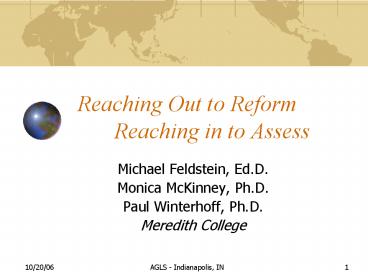Reaching Out to Reform Reaching in to Assess - PowerPoint PPT Presentation
1 / 21
Title:
Reaching Out to Reform Reaching in to Assess
Description:
10/20/06. AGLS - Indianapolis, IN. 1. Reaching Out to Reform. Reaching in to Assess ... Qual & quant cultural comparison is multiple. ... – PowerPoint PPT presentation
Number of Views:42
Avg rating:3.0/5.0
Title: Reaching Out to Reform Reaching in to Assess
1
Reaching Out to Reform Reaching in to Assess
- Michael Feldstein, Ed.D.
- Monica McKinney, Ph.D.
- Paul Winterhoff, Ph.D.
- Meredith College
2
Introduction
- Welcome!
- Introductions
- Outline of our Presentation
- Brief history and timeline of General Education
reform at Meredith - Overview of the revised goals requirements
- Overview of our assessment system
- Some practical exercises on embedded assessment
- Discussion
3
History of Program Development
- Timeline (Handout)
- We have accomplished an incredible amount as a
college. - Review of highlights lowlights!
4
The genesis of our new curriculum
The ideal side
5
Colleagues collaborating and coming to consensus
- A task force of faculty, staff, and students.
- An open process spanning 2 years.
- A general education program that will serve our
students well.
6
The genesis of our new curriculumThe other side
7
Changing a 30 year old curriculum involves
- Some hurt feelings
- Some hard feelings
- Accepting the open future the untried
- Politicking
- Turf battles
- Digging in the heels!
8
We made it through all that to establish a
measure of unity. Our new program is begun.
- Now the Real Work Begins-
- Implementation!
9
Making Connections Making a Difference
- A general education program for
- active learning
- intellectual development
- civic engagement
10
The Program Goals
- Gain knowledge of self, others, and the world,
- Think critically, quantitatively, and creatively,
- Communicate effectively,
- Participate responsibly and ethically in society,
the global community, and the natural world - Develop a broad and discerning understanding of
the richness of artistic expression and creative
imagination - Develop a thoughtful awareness of the spiritual
dimension of human experience - Lead physically active, health-enhancing lives
- Develop an understanding of the complexity of
knowledge and a desire to engage in lifelong
learning
11
The Curriculum Skills
- The general education program in cooperation with
major programs of study provides practice in the
following skills - effective and clear writing in English
- basic research skills information literacy
- Ethical reasoning
- effective oral communication
- And competencies
- fundamental technology competency
- foreign language speaking and reading
12
The Curriculum Knowledge and Values
- Knowledge The Traditional Electives
- Our Fields of Knowledge choices
- Values
- Civic Responsibility
- Individual Responsibility
- The Spiritual Dimension
- Diversity Human Rights
13
The Core Curriculum
- Courses at 3 levels designed to follow a
developmental progression - CORE 100 The Context of Culture
- CORE 200 Cultural Connections
- CORE 400 Global Perspectives
- Foundation Courses
- English composition
- History
- Religion
14
Putting together an assessment process
- Considering effective practices
- Reviewing our existing efforts
- Developing a comprehensive plan
15
Assessment to Date
- Institutional Testing
- NSSE- (National Survey of Student Engagement)
- ( of class presentations, hours studied,
written papers) - CIRP- (Cooperative Institutional Research
Program) - Academic Profile (MAPP) Measure of Academic
Proficiency and Progress exam (Measures Critical
thinking skills, Reading, Writing, and
Mathematical ability) - Administration (Problem)
- Freshman (Fall, 2002, 2003 2004)
- Juniors (Spring, 2005 and 2006)
16
Assessment to Date continued
- Other Assessments (Indirect Methods)
- Course evaluations
- Focus groups with students
- Student and advisor surveys
- End of course surveys on learning outcomes in
CORE 100 and CORE 200
17
New Assessment Method (Direct)
- Course Embedded Assessment
- Techniques utilized within a classroom to assess
students learning. (Exams, Paper, Presentation,
etc.) - Course Embedded Assessment Form
- Students do/dont acquire learning outcomes
- Scoring criteria used to evaluate performance
- Tasks used to measure objectives (e.g. class
assignment, exam, etc.) - Digital Locker (Xythos) - web-based tool that
allows transferring of files on a server for
storage and sharing with others
18
An exercise on embedded assessment
- Handout Please decide what activities you would
have students do to measure whether or not they
have met a particular learning outcome.
19
Reporting Out
- 10. oral comm/speech course sequence of 3 in
growing sophistication videotape or rubric - General portfolios? Utah - for writing
requirement (grad students would evaluate) year
long how long are they kept and can they be
tied to a particular student? - 1. genogram (family tree) map of environment
family, school, friends, etc. as a way to step
back and look at whole put down where there are
medical/mental health issues (could see patterns) - The outcomes are complex. Qual quant cultural
comparison is multiple. - 4. Recognize and improve demonstrate,
explain are perhaps better?
20
Through general education reform weve begun a
remarkable unique program. Implementation has
been trying! Assessment will be? Lets trust
that the way will open!
- Thank your attention and willingness to
participate and discuss! - Enjoy the rest of the conference.
21
Contact us
- www.meredith.edu/academics/gened/
- Winterhoff_at_meredith.edu
- McKinneyM_at_meredith.edu
- Feldstein_at_meredith.edu

